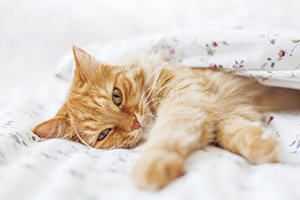
Has your pet had a wellness exam lately? You want to make sure your pet is as ready and healthy as possible to handle the cold. You may have to adjust your walking time to protect both you and your pet from weather associated health risks. Some health conditions may create a harder time regulating body temperature. If you have any concerns, please consult with your veterinarian. While most people believe that cats and dogs can handle the cold because of their fur, that is not true. Fur is not a perfect insulator. Like people, our pets are susceptible to frostbite and hypothermia and should be kept inside as much as possible.
Knowing your pet is repeatedly coming out of the cold and into the warmth of the house is normal for anyone with a doggie door. However, it can cause dry, itchy, flaking skin. It is recommended that you keep your home humidified to help with any winter skin dryness. Bathe your pets as little as possible during cold spells. Bathing too often can remove essential oils and increase the chance of dry, flaking skin.
Although you may be tempted, it is not advised that you shave your dog down to the skin in winter. If you have a short-haired pet, consider all the products on the market today that can help keep him/her warm. You might consider a coat or sweater with coverage from the base of the tail to the belly. Another tip is to massage petroleum jelly to prevent dryness and cracking of the paw skin or use booties when we have that occasional freeze and there is frozen water on the sidewalks.
You can feed your pet a little more during the cold months, but keep them at a healthy weight. They burn extra energy by trying to stay warm. Make sure your companion has plenty of water to keep your pet well-hydrated (again, helping to avoid dry skin).
Do not leave your pets alone in a car for any length of time. Just as that is true for the summer, it is true for the winter. Cars can act as refrigerators that hold in the cold and cause pets to freeze to death. No pet should be left alone outside for long periods of time in below freezing weather (which we do have every now and then), inside or outside a car.
Make some noise before turning on your car’s engine. Bang on the hood or honk the horn to encourage any critter which may have been drawn to a warm engine. Also, never leave your pets unattended while a space heater is turned on. If knocked over there is a potential of a fire. Heated pet mats should be used with caution because they are capable of causing burns.

Finally, no winter tip sheet would be complete without a warning on the dangers of antifreeze. It is deadly. There are coolants and antifreeze on the market that are less toxic to animals; however, care should be taken not to leave any anywhere your pet or any animal may have access.
Please remember: if it is too cold for you, it is probably too cold for your pet. Again, please try and keep your pets inside as much as possible during the cold weather and enjoy quality snuggle time! ©LVPSM
